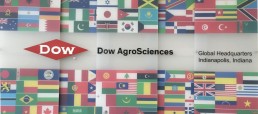Food and Sustainability in China
As part of my recent US trip, I was given the opportunity to fly to Indianapolis to give two presentations to DOW Agriculture leadership and sustainability teams on the sustainability and the future of food in China. As one of the largest firms in the food & agricultural sector, and one whose products extend throughout the food & agricultural value chain, I covered a wide range of important issues that are not only being faced by China, but by the world going forward to 2050, and the resulting conversations were nothing short of fantastic.
Given these are THE critical issues being faced, and will only grow in size over the next 25 years, it is important to create open dialogues with those who are both exposed to the challenges and seek to develop the solutions that solve them.
Key questions covered a range of issues of strategic importance, with the following being the most discussed:
- How does China define sustainability, what are the key issues of concern, and what/who are the catalysts for change?
- What are the megatrends that are driving consumer demand in China, and what will be the resulting "foodprint" of China’s plans to urbanize another 250 million people?
- What are the challenges of China’s farmers, processors, and brands to deliver safe and affordable foods at the quantities needed, and what are the short term stop gaps that will be needed to overcome those challenges?
- What are the key concerns of consumers, what are the perceived/real risks that they face, and what are the actions they take as a result?
- Who are the key stakeholders, and how are brands effectively engaging with stakeholders to better understand the needs of the market and develop solutions specific for China?
As with many groups that I meet with, a lot of time was spent really helping the people I was meeting with understand not only the urgency of the situation, but also how the systems themselves are wired differently. That, while the US and EU are largely more resilient to the range of shocks that are on their way, in the world's developing nations a confluence of rising demand and increasingly unstable supplies should be the critical focal point. Not just in the fact that it could potentially lead to disaster, but that it is itself the opportunity that they are looking for.
Just as it will be for the vertical farmers I visited.

